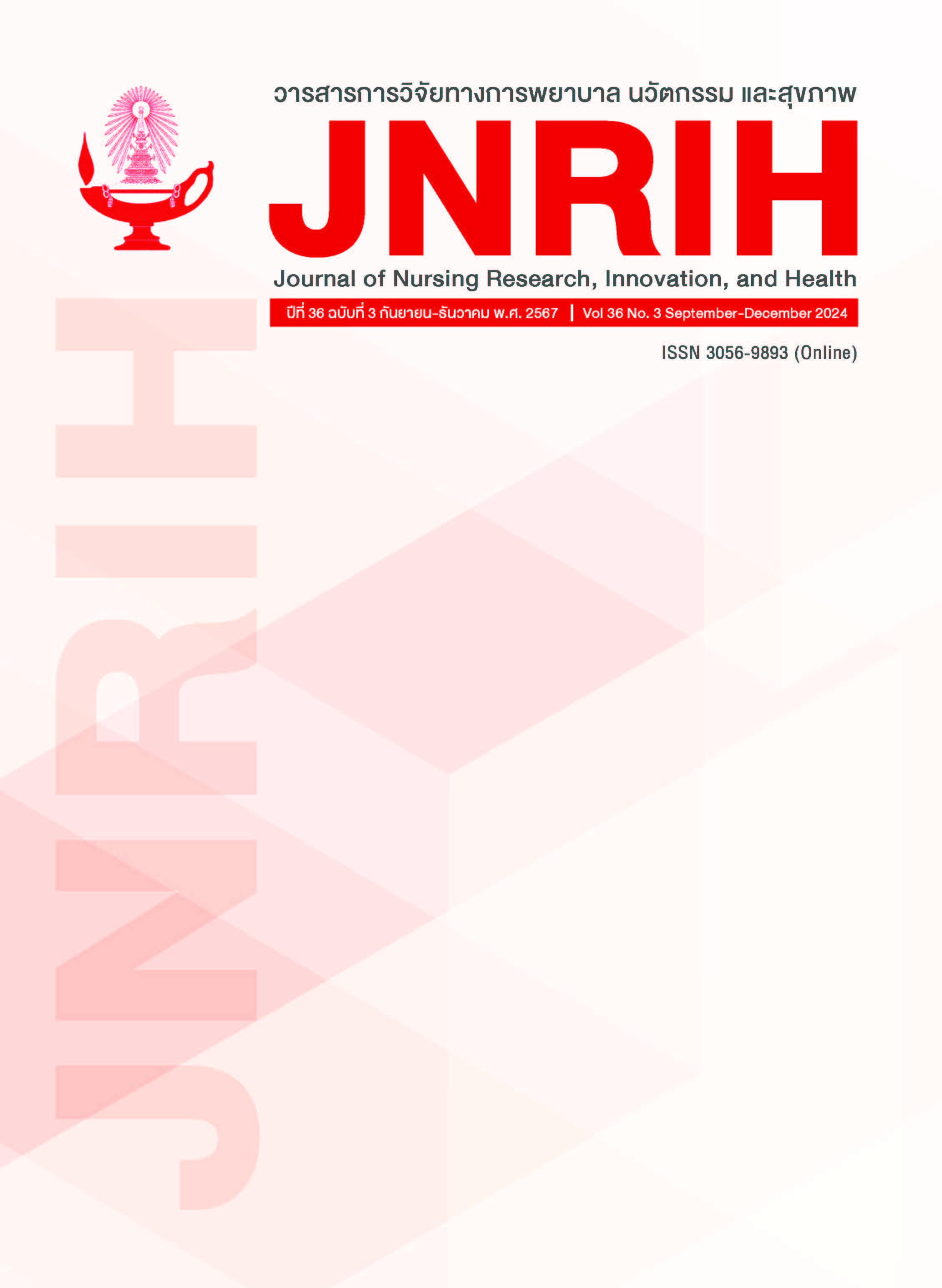ปัจจัยที่มีความสัมพันธ์กับความเหนื่อยหน่ายของคู่ชีวิตของผู้ป่วยโรคจิตเภท
คำสำคัญ:
ความเหนื่อยหน่าย, คู่ชีวิต, ผู้ป่วยโรคจิตเภทบทคัดย่อ
วัตถุประสงค์: เพื่อศึกษาความเหนื่อยหน่ายของคู่ชีวิตของผู้ป่วยโรคจิตเภท และปัจจัยสัมพันธ์ระหว่าง เพศ ระยะเวลาในการดูแลผู้ป่วย ความเครียด การสนับสนุนทางสังคม สัมพันธภาพผู้ป่วยกับคู่ชีวิต ภาระการดูแลผู้ป่วย การรับรู้การถูกตีตรา อาการทางบวก และอาการทางลบ กับความเหนื่อยหน่ายของคู่ชีวิตของผู้ป่วยโรคจิตเภท
รูปแบบการวิจัย: การวิจัยเชิงบรรยายหาความสัมพันธ์
วิธีดำเนินการวิจัย: กลุ่มตัวอย่าง คือ คู่ชีวิตของผู้ป่วยโรคจิตเภทที่เข้ารับการรักษาในโรงพยาบาลจิตเวชและโรงพยาบาลที่มีแผนกผู้ป่วยนอกจิตเวช ในเขตกรุงเทพมหานคร จำนวน 180 คน เครื่องมือที่ใช้ในการวิจัย คือ แบบสอบถามข้อมูลส่วนบุคคล แบบประเมินความเหนื่อยหน่าย แบบวัดความเครียด แบบสอบถามการสนับสนุนทางสังคม แบบประเมินสัมพันธภาพผู้ป่วยกับคู่ชีวิต แบบประเมินภาระการดูแลผู้ป่วย แบบประเมินการรับรู้การถูกตีตรา แบบประเมินอาการทางบวก และแบบประเมินอาการทางลบผู้ป่วยโรคจิตเภท วิเคราะห์ข้อมูลโดยสถิติเชิงพรรณาและสถิติสัมประสิทธิ์สหสัมพันธ์เพียร์สัน
ผลการวิจัย: ระดับความเหนื่อยหน่ายทั้ง 3 ด้าน พบว่า ด้านความอ่อนล้าทางอารมณ์อยู่ในระดับต่ำ ( = 11.02, SD = 10.83) ด้านการมองข้ามความเป็นบุคคลของผู้ป่วยและผู้อื่นอยู่ในระดับปานกลาง( = 6.36, SD = 8.06) และด้านความไม่สมหวังในผลสำเร็จของผู้ดูแลอยู่ในระดับสูง ( = 13.45, SD=9.64) การศึกษาความสัมพันธ์ระหว่างปัจจัยต่าง ๆ กับความเหนื่อยหน่ายมีค่านัยสำคัญทางสถิติที่ระดับ .05 ดังนี้ สัมพันธภาพผู้ป่วยกับคู่ชีวิต และการสนับสนุนทางสังคมมีความสัมพันธ์ทางลบ (r = -.378 และ -.154 ตามลำดับ) อาการทางลบของผู้ป่วยโรคจิตเภทมีความสัมพันธ์ทางบวก (r = .305) อาการทางบวกของผู้ป่วยโรคจิตเภทมีความสัมพันธ์ทางบวก (r = .509) ภาระการดูแลผู้ป่วยและการรับรู้การถูกตีตราของคู่ชีวิตมีความสัมพันธ์ทางบวก (r = .779 และ .711 ตามลำดับ) ความเครียดมีความสัมพันธ์ทางบวก (r = .819) เพศและระยะเวลาในการดูแลผู้ป่วย ไม่มีความสัมพันธ์
สรุป: ผลการวิจัยสามารถนำไปวางแผนการจัดกิจกรรมเพื่อลดปัจจัยที่ส่งผลต่อความเหนื่อยหน่ายของคู่ชีวิตของผู้ป่วยโรคจิตเภทต่อไป
เอกสารอ้างอิง
Department of mental health. Reports of patients receiving psychiatric services. 2566. Retrieved 4 March 2023 from https://dmh.go.th/report/datacenter/hdc/ (in Thai)
Department of mental health. Department of Mental Health Strategic Plan During the 12th National Economic and Social Development Plan (2017-2021) and the Department of Mental Health Policy for the year 2017-2018. Nonthaburi: Bureau of Mental Health Strategy Department of Mental Health. 2016. (in Thai)
Manote Lotrakul & Pramote Sukanich. 2015. Ramathibodi Essential Psychiatry. Fourth Edition. Bangkok: Department of Psychiatry Faculty of Medicine Ramathibodi Hospital. 2015. 640 pages. (in Thai)
Rapeepong Youngwarasawasd, Pongpan Kirdpitak & Prasarn Malakul Na Ayuthaya. The integrative family counseling model for enhancing couple marital success. Journal of Education Research Faculty of Education, Srinakharinwirot University. 2016; 10(1): 130-175. (in Thai)
Kanya Sritawan & Ratchaneekorn Upasen. Selected factors related to burnout in caregiver of persons with schizophrenia in community. Journal of the royal Thai army nurses. 2017; 18(1): 308-322. (in Thai)
Sansanee Treesarn. Happiness of schizophrenic patient’s couple. [Individual study]: Thammasat University; 2010. (in Thai)
Lawn, S., & McMahon, J. (2014). The Importance of Relationship in Understanding the Experiences of Spouse Mental Health Carers. Qualitative Health Research, 24 (2), 254–266.
Seeman, M. V. (2013). Bad, burdened or ill? Characterizing the spouses of women with schizophrenia. International Journal of Social Psychiatry, 59(8), 805–810.
Mayuree Klubwong, Pachongchiit Intasuwan, Wiladlak Chuawanlee, Nuntika Thaviichachart. Factors affecting burnout and care behavior of caregiver of schizophrenic patiients. The Journal of Behavioral Science. 2009; 15(1): 57-75. (in Thai)
Asghar A, Majeed S, Malik F. Psychological Distress, Affiliate Stigma and Burnout in Caregivers of Patients with Schizophrenia. International Journal of Social Sciences & Educational Studies. 2018; 5(2): 73-85.
Maslach C, Susan E J. The measurement of experienced burnout. JOURNAL OF OCCUPATIONAL BEHAVIOUR. 1981;2: 99-113.
Locke, H.J., & Wallace, K.M. (1959). Short Marital-Adjustment and Prediction Tests: Their Reliability and Validity. Marriage and family living, 21(3), 251-255
Cobb S. Social support as a moderator of life stress. Psychosomatic Medicine. 1976; 38(5): 300-314.
Pornchai Jullamate & Yupin Thanatwanich (2001). Stress and coping of caregiivers of stroke patients. The Journal of Faculty of Nursing Burapha University, 9, 32-46. (in Thai)
Montgomery, R. I. V., Gonyea, J. G., & Hooyman, N. P. (1985) Caregiving and the experience of subjective and objective burden. Family Relations, 34(5): 19-26
Mak, W. W., & Cheung, R. Y. M. (2010). Self-stigma among concealable minorities in Hong Kong: Conceptualization and unified measurement. The American Journal of Orthopsychiatry, 80(2): 267-281.
Kay, S. R., Fiszbein, A., & Opler, L. A. (1987). The positive and negative syndrome scale (PANSS) for schizophrenia. Schizophrenia bulletin, 13(2), 261–276. https://doi.org/10.1093/schbul/13.2.261
Demirbas, H., & Kizil, E. T.A O. (2017). Burnout and Related Factors in Caregivers of outpatients with Schizophrenia. Insights on the Depression and Anxiety., 1, 01-11.
ดาวน์โหลด
เผยแพร่แล้ว
ฉบับ
ประเภทบทความ
สัญญาอนุญาต
ลิขสิทธิ์ (c) 2024 วารสารการวิจัยทางการพยาบาล นวัตกรรม และสุขภาพ

อนุญาตภายใต้เงื่อนไข Creative Commons Attribution-NonCommercial-NoDerivatives 4.0 International License.
##default.contextSettings.thaijo.licenseTerms##


